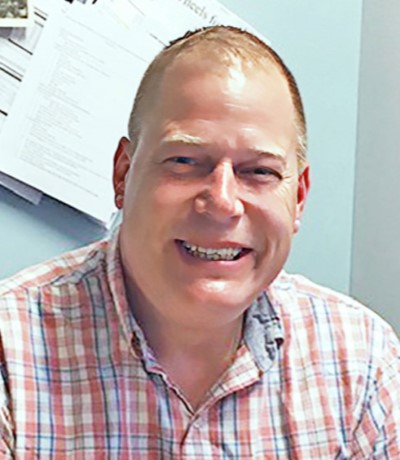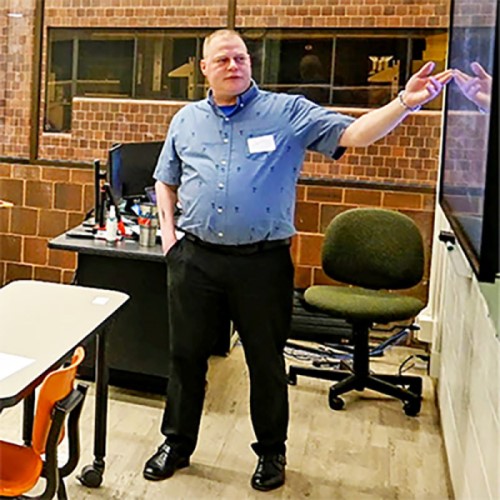Social Security makes every effort to ensure that any information published is accurate and up to date, but some information on this webpage may be historical.
Road Warrior: Jeff's Story
Published in 2023
 Jeff was a 22-year-old car enthusiast who applied his aptitude for fixing things to the Marine Corps Tank Unit. The Marines depend on their Battle Tank Repair Technicians for reliable protection and transportation that won't leave them stranded in dangerous situations. With this responsibility, he acquired skills he carried into the civilian workforce as a limousine mechanic. In 2001, when Jeff made this transition, he couldn't know how vital Corps values would be for him in the years ahead.
Jeff was a 22-year-old car enthusiast who applied his aptitude for fixing things to the Marine Corps Tank Unit. The Marines depend on their Battle Tank Repair Technicians for reliable protection and transportation that won't leave them stranded in dangerous situations. With this responsibility, he acquired skills he carried into the civilian workforce as a limousine mechanic. In 2001, when Jeff made this transition, he couldn't know how vital Corps values would be for him in the years ahead.
The Dark Road
On a motorcycle ride in the summer of 2009, when a car pulled out in front of him, Jeff flipped over the roof, and everything went black. It was the kind of catastrophic accident that's usually fatal. Jeff's body was crushed, and he spent the next two weeks in a medically induced coma.
He regained consciousness at the hospital in a haze of pain and confusion. Five broken bones in both hips, a compound fracture in the right arm, and extensive nerve damage transformed Jeff from a strong young man into a traumatized person who couldn't tie his shoes. Jeff's injuries caused him to lose the use of his right arm, and it would be a decade before he acclimated to this difficult new reality. Among the hardest years was the first, which he spent figuring out how to get through each day using a wheelchair with one functional limb.
"My entire life changed. Everything was hard. I couldn't write, brush my teeth, or open a can," he recalls, "…and accessibility is a real issue. Not being able to get around, clear doorways or get upstairs… everything I never had to think about before felt insurmountable."
Jeff moved in with his mother and he was grateful for his family's support. He received Social Security Disability Insurance (SSDI) and spent the next eight years seeing specialists, enduring surgeries and finding new ways to perform the activities of daily living. His grueling rehabilitation regimen was unlike any workout he had experienced in the Marines. It was the most difficult experience of his life.
Lost
While Jeff was devoted to recovering his independence, progress was slow. It was easy to become discouraged.
"A friend built me a ramp so I could go to the neurosurgeon, pain, hand and foot doctors, and rehab," he recalls. It was depressing. I was used to hanging out with friends, being active, and now I couldn't get out of the house. I used up all my savings and had to sell my car."
Jeff was overwhelmed by feelings of hopelessness.
"You lose a lot when you're not working," he says. "You lose structure and social skills... I couldn't work with my hands, and I remember thinking, ‘So, this is my life now? On mom's couch?'"
By 2015, Jeff had progressed enough to contemplate a fork in the dark road he had been traveling.
"…I had to find a different direction. … I remembered what got me through bootcamp," he recalled. "The Marine Corps' mindset, 'improvise, adapt and overcome,' helped me. I applied some of the strategies I had practiced during my service. Basically, things must get done and you can't overthink [them]. You just have to adapt to the situation and keep moving forward. Improvising and adapting for me meant I'd… move forward one problem, one small step, one moment at a time," he continued. "… and if it takes me longer to do things, so what? I'll adjust to the time it takes."
Rerouting
Propelled by incremental successes and recovered strength, Jeff felt ready to lean into his future. At the end of 2015, an advertisement for Genesee Community College prompted his decision to return to school.
"I don't know why," he reflects. "I wasn't a great student in high school. I was too busy socializing back then… and I didn't know how I'd pay for it. But I had to take a different route; try something new."
Help soon arrived in the mail from Social Security. The notice had information about Ticket to Work, a free and voluntary program that supports career development for people with disabilities ages 18 through 64 who want to work. Jeff called the number provided and learned that he could access a range of support services to help him prepare for, find or maintain employment. State Vocational Rehabilitation (VR) agencies and service providers known as Employment Networks (EN) offer these supports, which can include resources for training or education. Some ENs serve people with a specific type of disability; others offer certain types of services. The program is set up to help people progress toward financial independence.
Jeff sought help from Access VR, a New York State Vocational Rehabilitation agency. A career counselor helped him identify employment goals that aligned with his circumstances, skills and interests. They worked on an Individual Plan for Employment (IPE), identifying a college degree as Jeff's goal. State funds through VR covered his college expenses.
Access VR also connected him with the disability services office at Genesee Community College. Together, they educated Jeff about assistive technology and reasonable accommodations that would facilitate a successful college experience. Jeff worked with his VR counselor and the disability services counselor to put accommodations in place that addressed his set of disability-related needs. "I got a lot of accommodations, such as help with taking notes, audiotaped lessons, a separate testing area…" he recalls. Such accommodations for students like Jeff may include quiet spaces or extra time for taking exams, a notetaker, reserved space in the classroom to help someone hear and see the instructor, an accessible laptop with Augmentative and Alternative Communication (AAC) software, a tablet, access to recorded lectures for review, and course materials in alternative formats.
"My VR counselor was amazing," he says. "I learned there are a lot of tools to help someone use a computer without typing… to access classroom lectures, convert voice to text. Dragon dictation was a game changer for me," he says "…and Genesee Community College provided a notetaker so I could focus on listening to lectures in class. Assistive technologies and other accommodations were incredibly helpful in enabling my education and adaptation!"
In 2016, Jeff earned an associate degree from Genesee Community College, and then went on to complete a Bachelor of Arts in psychology at the State University of New York Brockport in 2018. Maturity, life experience and tenacity helped him graduate Phi Beta Kappa, America's oldest and most prestigious academic honor society.
"I never dreamed that getting through calculus would be easier for me than putting on a pair of socks! The support and resources I received through the Ticket Program and from my college advisors gave me a shot at improving my life," he says. "It was an opportunity I was not going to waste."
Work Incentives Ease Jeff's Next Transition
When VR services came to an end in 2018, Jeff's counselor referred him to the County of Genesee American Job Center, a Ticket Program provider. The Genesee staff educated him about Work Incentives. These rules make it easier for adults with disabilities to explore work and maintain some or all of their disability benefits. Jeff would not suddenly lose his Medicare and SSDI when he returned to work. He would have time to determine how full-time employment would work for him. If his disability interfered with work, there are Work Incentives that might allow him to receive benefits again without a new application.
"I had been out of work for 10 years, had worked with cars, not people… and I didn't know if I could sustain a 40-hour week," Jeff recalls. "It was a relief to know I could test the waters."
Shifting into a Higher Gear
 Jeff's success in college gave him the confidence he needed as he prepared to enter a brand-new field. The staff at Genesee provided encouragement and support.
Jeff's success in college gave him the confidence he needed as he prepared to enter a brand-new field. The staff at Genesee provided encouragement and support.
He was inspired by the counselors who helped him through his ordeal and wanted to pursue a career helping other people. "We talked about potential barriers to employment, advocacy with employers, and how to ask for accommodations," says Teresa, Director of Genesee County Job Development and Career Center.
After they provided career counseling, completed his resume, practiced mock interviews, and reviewed job leads, it became clear to Teresa and other staff at Genesee County's Career Center that Jeff was a great match for a position that recently opened within the center.
In the summer of 2018, a decade after his accident, Jeff's career as an Employment Training Counselor began.
"Jeff takes any challenge we give him, masters it and just keeps on going," Teresa says. "He has advanced quickly because of the care and compassion he shows customers. Jeff is a team player who helps others face barriers by sharing the mindset and the strategies that helped him through his own struggles. This makes him an exceptional counselor!"
"I was tossed into this world [of disability and support services], and helping people advance in their lives is far more satisfying than fixing a car," Jeff says.
A New Set of Wheels
Having traded SSDI for a paycheck, Jeff is enjoying the freedom that comes with restored financial stability. Being able to purchase a new car made him think of how far he had come from that low point when a disability grounded him on his mother's couch.
"Participating in the Ticket to Work Program was the best decision I ever made," he says. "The help I received… was amazing. I didn't know I could do the work I'm doing. Step by step, they helped me create a new pathway back to the workforce and I'm in a better place in my life. Now I'm helping other people find their way, and it's so satisfying!"
Ticket to Work helped Jeff find his path to a better future. Find yours!
To learn more, call the Ticket to Work Help Line at 1-866-968-7842 or 1-866-833-2967 (TTY), or visit https://choosework.ssa.gov.